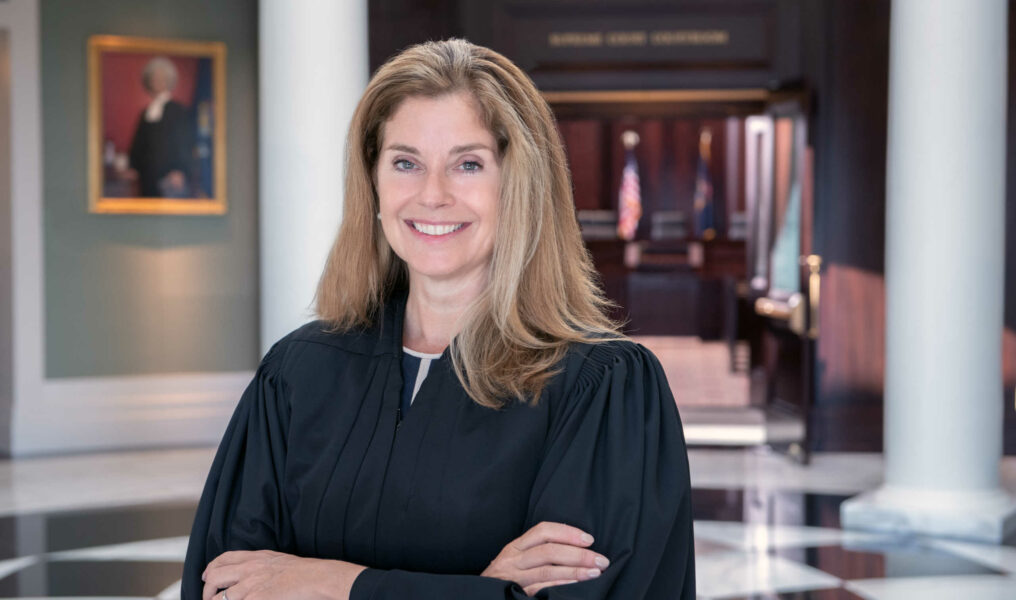As the November election draws nearer, Americans won't be voting just for a presidential candidate, both state and national candidates will be voted upon, too. In Michigan, there will be dozens of candidates running for the first time and for reelection across the state. Between The Lines has reached out to pro-equality candidates to get a sense of their goals and priorities for the LGBTQ community if they are to be elected. To get a full list of the pro-equality candidates running, visit mivoterguide.com.
Here, Supreme Court Chief Justice Bridget Mary McCormack answers questions about why she would be a good fit for reelection to her Chief Justice seat on the Court.
Why do you think that you're a good fit for reelection?
I hope that people are confident that the work that I have done so far on the court is worth continuing to support me in doing. I think that in addition to my contributions in the court's decisions, I've taken up leadership roles not only since I've been the chief justice but even before that on a lot of the other courts. I've done administrative oversight work where I think it has a tremendous impact on how people experience justice throughout our state. Michigan has 242 trial courts and they adjudicate 4 million cases a year and the Supreme Court has administrative oversight over them. And through that administrative oversight role, we have a real opportunity to improve the way people experience justice and I've been working very hard on a number of ways in which we can do that, including my co-chairing with the lieutenant governor and the governor's task force on jail and pretrial incarcerations and the Justice for All Task Force, which is something we announced last year. And it's a partnership between the courts and we try to address the extremely high number of people in Michigan who cannot afford lawyers when they have to figure out how to deal with a legal problem. Eight out of 10 people in Michigan can't afford lawyers, and our Justice for All Task Force is aimed at closing that civil justice gap. So I hope people are confident that the work I've done is worth supporting me to continue doing.
What have you learned during your time on the court that sets you apart from other candidates?
Well, having served on the court for 7 1/2 years now, I guess it's fair to say that I've learned a lot about how the Supreme Court functions as well as all the ways it can have a positive impact on people's lives. And I've put a lot of time into how we can do that effectively and efficiently, and we're undergoing some of the most important changes in the court system over the last six months. We've seen more change than we have in the last 30 years and I've been at the center of all of that and it puts me in a good position to continue to make sure that that change is for the benefit of the people of Michigan.
What would be your top three priorities if elected?
I think the top three priorities are finishing the work of the Jail and Pretrial Task Force. We delivered 18 recommendations to the legislature in January and a number of those recommendations have already been reflected in bill draft and a number of those have already had hearings. I see that a couple of them were passed unanimously by the House Judiciary Committee, but there is still more work to do and I'd like to finish it. With the help of The Pew Charitable Trusts, [it's] the first time we're collecting statewide data to try and understand why Michigan's county jail populations have tripled in the last 30 years while crime is at a 50-year low. And not only do we now understand what's driving those numbers but we also heard from people across the state, studied best practices and we have an opportunity to make Michigan a national leader in pretrial and jail reform. And with all the work we've put into it, I'd like to push it across the finish line. I also really think the work of the Justice for All Task Force is critical to making Michigan a national leader in civil justice reform. Eighty percent of people in Michigan, if they're facing a civil legal problem like eviction or a family problem or a consumer debt problem, they have to navigate courts on their own because they can't afford lawyers and that really can undermine equal access to justice — which is the foundation upon which all the rest of it stands. So I think it's really important to finish that work. We also are going to start doing some important work in the area of juvenile justice, and I think there's a lot of opportunity to make a difference in so many families' lives when they have kids entangled in the juvenile justice system, and I think that's going to be a priority if I'm reelected as well.
In light of the recent Black Lives Matter protests, many communities around Michigan and the nation are looking closely at existing justice systems and considering reform. In your role, what are the steps you're taking to promote fairness in your courtroom?
Every decision in every case that we have to make we have to approach it with a commitment to the law and the Constitution. But as I try to make clear, very few cases make it to the Michigan Supreme Court. And that doesn't mean they're not important, those issues become the rule of law for the whole state, so each one is important. But most people experience [the law] in their local courts, in their trial courts and that's where it really matters what our approach is to the people who come to those courts. And we have had incredibly successful problem-solving courts in Michigan where the entire theory of the court process is to connect people to resources to help them solve the problem that resulted in them ending up in court in the first place. And we have all kinds of data now to justify how important and critical those programs are and I think we're always looking at ways to expand our restorative justice model in our courts, but some of these other structural changes — like the way we think about the front end of the criminal justice system through the recommendation of the jail Task Force and the ways in which we can think about the function of the juvenile justice system — have a far greater ability to impact more people and impact whole communities.
Why is fighting to maintain LGBTQ equity valuable to you as a judge?
Well, I think the only thing courts have is confidence in our decisions and our outcomes. I mean by that, we don't have any army, we don't have any weapons, we don't have any money, we don't have the enforcement mechanisms that other branches of the government might have. All we have is public confidence in what we do. And the public loses confidence when people aren't treated equally; it's fairly simple and understandable from little kids to your grandparents. Equal treatment under law is as foundational as it gets. And if you want people to have confidence in the court's outcomes, and therefore abide them, then that basic foundation principle has to be the center of what you do.
What would you like more people to understand about the Supreme Court?
How much it matters. The [Supreme] Court has this tremendous ability to make a difference in how the courts at the state operate through our administrative oversight role. So many people have to use their local courts — think of the 3 or 4 million cases a year. That's a lot of people in Michigan who are impacted by those courts. So I guess I hope people will focus on how important this job is and how important the court is.










